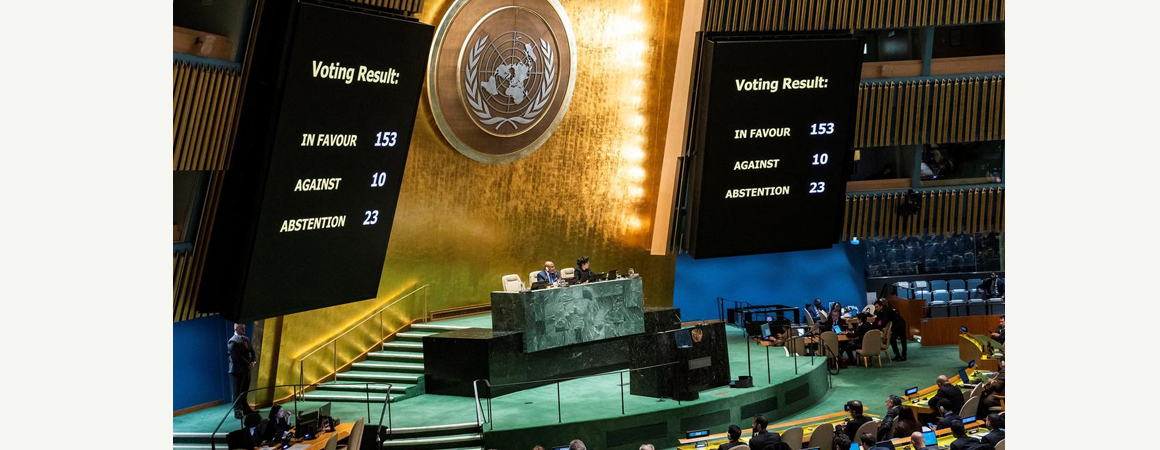The United Nations General Assembly votes overwhelmingly for ceasefire, release of hostages and international law to be observed
India on Tuesday voted in favour of a United Nations General Assembly (UNGA) resolution that called on Israel for an immediate ceasefire, the protection of civilians in accordance with international law and the release of all hostages. India was among 153 countries that made up a massive 4/5th majority in the Assembly who voted in favour of the resolution, where only 10 countries, including the U.S. and Israel, voted against the resolution, and 23 countries, mainly from Europe abstained.
Despite being “unsatisfied” with the UNGA resolution, Israel said it appreciated India’s support and votes in favour of two proposed amendments that were not adopted by the UNGA.
Thanking India for its vote, the Palestinian Ambassador to India said that all countries must say “enough is enough”. “ 153 countries have voted for ceasefire but the U.S. has opposed it and by doing so, the U.S. has once again proved that they are partner of Israel in this continuing massacre of Palestinian people,” Ambassador of Palestine Adnan Abu Al Haija told The Hindu.
The resolution did not include any specific reference to the October 7 terror attacks in Israel by Hamas, the reason India had refused to vote in favour of a similar UNGA resolution on October 27. In the explanation of vote (EoV) delivered on Wednesday, India’s Permanent Representative to the U.N. Ruchira Khamboj did not clarify the reason for India’s shift but said that India “welcomes” the fact that the international community had been able to find a “common ground” to address the situation in West Asia, where more than 18,000 people had been killed by Israeli operations in the past two months in retaliation for the Hamas attacks in which 1,200 were killed.
‘Two-state solution’
Outlining four “dimensions” to the crisis, Ms. Khamboj mentioned the October 7 “terrorist attack” without naming Hamas, the “humanitarian crisis and large-scale loss of civilian lives”, the issue of observing international humanitarian law “in all circumstances”, and the effort to find a lasting “two-state solution” to the question of Palestine.
“Our challenge in this extraordinarily difficult time is to strike the right balance,” Ms. Khamboj added.
The UNGA resolution “Protection of civilians and upholding legal and humanitarian obligations”, that was introduced by Egypt and co-sponsored by 21 countries, followed the U.S.’s decision to veto a similar resolution calling for an immediate ceasefire in the U.N. Security Council on December 8. The U.S. decision was unusual as it came despite an explicit invocation of “Article 99” by U.N. Secretary General Antonio Guterres that the situation in Gaza “threatens the maintenance of international peace and security,” a clause no UNSG has invoked since 1989 and the war in Lebanon.
“The gravity and complexity of what the international community faces is underlined by the Secretary General invoking Article 99 of the Charter of the United Nations,” Ms. Khamboj said, explaining India’s vote.
When asked about India’s vote, the Israeli Embassy in Delhi said it appreciated Prime Minister Narendra Modi’s “stand with Israel against terrorism” after the attacks.
“Though unsatisfied in general with the decision made in the U.N. Assembly yesterday, we appreciate India’s votes in favor of the amendments of both U.S. and Austria,” an Embassy spokesperson told The Hindu.
While the UNGA does not have the power to enforce its resolutions as the UNSC does, it carries the sentiment of the global community against the Israeli bombardment of Gaza that has rendered more than a million people homeless. At the UNGA the U.S. also proposed an amendment that would insert a specific mention of “heinous terrorist attacks by Hamas that took place in Israel starting 7 October 2023 and the taking of hostages”, while Austria proposed an amendment to name Hamas and other groups that are holding Israeli hostages. India voted in favour of them, but both amendments were dropped as they did not receive the votes required.
‘Catastrophic humanitarian situation’
The final resolution passed said that the UNGA expressed. “grave concern over the catastrophic humanitarian situation in the Gaza Strip and the suffering of the Palestinian civilian population, and emphasising that the Palestinian and Israeli civilian populations must be protected in accordance with international humanitarian law,” while demanding an immediate ceasefire, observance of international law, immediate and unconditional release of all hostages and humanitarian access to be ensured.
“I honestly don’t know how can someone look in the mirror and support a resolution that does not condemn Hamas and does not even mention Hamas by name,” Israeli Ambassador said in comments before the vote, urging all Member-States to vote against the resolution.
All eyes are now on the explanation by the government of its decision to shift from its abstention two months ago, when 7,000 Palestinians, including 3,000 children, had already died in the bombardment, to the latest vote in favour, and whether this represents yet another shift in India’s stance on the Middle East crisis.
After its vote to abstain from the previous UNGA resolution that had called for an immediate ceasefire on October 27, the Modi government had released a lengthy unofficial note explaining its stand. In it the government had said that the resolution had not included any “explicit condemnation” of the terror attacks of October 7 or of hostage releases. “In the absence of all the elements of our approach not being covered in the final text of the resolution, we abstained in the vote,” the note said, adding that there can be “no equivocation on terror”.
Two months on, India shifts position, votes in favour of immediate ceasefire by Israel
The United Nations General Assembly votes overwhelmingly for ceasefire, release of hostages and international law to be observed
India on Tuesday voted in favour of a United Nations General Assembly (UNGA) resolution that called on Israel for an immediate ceasefire, the protection of civilians in accordance with international law and the release of all hostages. India was among 153 countries that made up a massive 4/5th majority in the Assembly who voted in favour of the resolution, where only 10 countries, including the U.S. and Israel, voted against the resolution, and 23 countries, mainly from Europe abstained.
Despite being “unsatisfied” with the UNGA resolution, Israel said it appreciated India’s support and votes in favour of two proposed amendments that were not adopted by the UNGA.
Thanking India for its vote, the Palestinian Ambassador to India said that all countries must say “enough is enough”. “ 153 countries have voted for ceasefire but the U.S. has opposed it and by doing so, the U.S. has once again proved that they are partner of Israel in this continuing massacre of Palestinian people,” Ambassador of Palestine Adnan Abu Al Haija told The Hindu.
The resolution did not include any specific reference to the October 7 terror attacks in Israel by Hamas, the reason India had refused to vote in favour of a similar UNGA resolution on October 27. In the explanation of vote (EoV) delivered on Wednesday, India’s Permanent Representative to the U.N. Ruchira Khamboj did not clarify the reason for India’s shift but said that India “welcomes” the fact that the international community had been able to find a “common ground” to address the situation in West Asia, where more than 18,000 people had been killed by Israeli operations in the past two months in retaliation for the Hamas attacks in which 1,200 were killed.
‘Two-state solution’
Outlining four “dimensions” to the crisis, Ms. Khamboj mentioned the October 7 “terrorist attack” without naming Hamas, the “humanitarian crisis and large-scale loss of civilian lives”, the issue of observing international humanitarian law “in all circumstances”, and the effort to find a lasting “two-state solution” to the question of Palestine.
“Our challenge in this extraordinarily difficult time is to strike the right balance,” Ms. Khamboj added.
The UNGA resolution “Protection of civilians and upholding legal and humanitarian obligations”, that was introduced by Egypt and co-sponsored by 21 countries, followed the U.S.’s decision to veto a similar resolution calling for an immediate ceasefire in the U.N. Security Council on December 8. The U.S. decision was unusual as it came despite an explicit invocation of “Article 99” by U.N. Secretary General Antonio Guterres that the situation in Gaza “threatens the maintenance of international peace and security,” a clause no UNSG has invoked since 1989 and the war in Lebanon.
“The gravity and complexity of what the international community faces is underlined by the Secretary General invoking Article 99 of the Charter of the United Nations,” Ms. Khamboj said, explaining India’s vote.
When asked about India’s vote, the Israeli Embassy in Delhi said it appreciated Prime Minister Narendra Modi’s “stand with Israel against terrorism” after the attacks.
“Though unsatisfied in general with the decision made in the U.N. Assembly yesterday, we appreciate India’s votes in favor of the amendments of both U.S. and Austria,” an Embassy spokesperson told The Hindu.
While the UNGA does not have the power to enforce its resolutions as the UNSC does, it carries the sentiment of the global community against the Israeli bombardment of Gaza that has rendered more than a million people homeless. At the UNGA the U.S. also proposed an amendment that would insert a specific mention of “heinous terrorist attacks by Hamas that took place in Israel starting 7 October 2023 and the taking of hostages”, while Austria proposed an amendment to name Hamas and other groups that are holding Israeli hostages. India voted in favour of them, but both amendments were dropped as they did not receive the votes required.
‘Catastrophic humanitarian situation’
The final resolution passed said that the UNGA expressed. “grave concern over the catastrophic humanitarian situation in the Gaza Strip and the suffering of the Palestinian civilian population, and emphasising that the Palestinian and Israeli civilian populations must be protected in accordance with international humanitarian law,” while demanding an immediate ceasefire, observance of international law, immediate and unconditional release of all hostages and humanitarian access to be ensured.
“I honestly don’t know how can someone look in the mirror and support a resolution that does not condemn Hamas and does not even mention Hamas by name,” Israeli Ambassador said in comments before the vote, urging all Member-States to vote against the resolution.
All eyes are now on the explanation by the government of its decision to shift from its abstention two months ago, when 7,000 Palestinians, including 3,000 children, had already died in the bombardment, to the latest vote in favour, and whether this represents yet another shift in India’s stance on the Middle East crisis.
After its vote to abstain from the previous UNGA resolution that had called for an immediate ceasefire on October 27, the Modi government had released a lengthy unofficial note explaining its stand. In it the government had said that the resolution had not included any “explicit condemnation” of the terror attacks of October 7 or of hostage releases. “In the absence of all the elements of our approach not being covered in the final text of the resolution, we abstained in the vote,” the note said, adding that there can be “no equivocation on terror”.






NO COMMENT